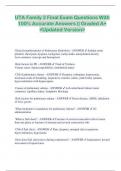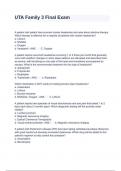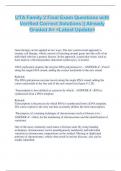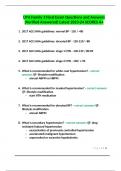Uta family 3 final exam - Study guides, Class notes & Summaries
Looking for the best study guides, study notes and summaries about Uta family 3 final exam? On this page you'll find 24 study documents about Uta family 3 final exam.
Page 3 out of 24 results
Sort by

-
UTA Family 3 Final Exam Questions With 100% Accurate Answers || Graded A+ <Updated Version>
- Exam (elaborations) • 47 pages • 2024
-
- $11.49
- + learn more
UTA Family 3 Final Exam Questions With 100% Accurate Answers || Graded A+ <Updated Version> Clinical manifestations of Pulmonary Embolism - ANSWER Sudden onset pleuritic chest pain, dyspnea, tachypnea, tachycardia, unexplained anxiety Less common- syncope and hemoptysis Risk factors for PE - ANSWER Triad of Virchow Venous stasis, hypercoagulability, endothelial injury CM of pulmonary edema - ANSWER Dyspnea, orthopnea, hypoxemia, increased work of breathing, inspiratory crac...
UTA Family 3 Final Exam Questions and Answers (Verified Answered) Latest 2023-24 SCORES A+

-
NURSING5336) 2024 Latest Questions And Answers .Already pass!!!
- Exam (elaborations) • 85 pages • 2024
-
- $14.39
- + learn more
UTA Family 3 Final Exam A patient haA patient has recurrent cluster headaches and asks about abortive therapy. Which therapy is effective for a majority of patients with cluster headaches? a. Lithium b. NSAIDs c. Oxygen d. Verapamil - ANS C. Oxygen A patient reports recurrent headaches occurring 1 or 2 times per month that generally occur with weather changes or when sleep patterns are disrupted and describes them as severe, with throbbing on one side of the head and sometim...

-
UTA Family 2 Final Exam Questions with Verified Correct Solutions || Already Graded A+ <Latest Update>
- Exam (elaborations) • 51 pages • 2024
-
- $11.99
- + learn more
UTA Family 2 Final Exam Questions with Verified Correct Solutions || Already Graded A+ <Latest Update> Gene therapy can be applied in two ways. The less controversial approach is somatic cell therapy, which consists of inserting normal genes into the cells of an individual who has a genetic disease. In the approach, a particular tissue, such as bone marrow cells that produce abnormal erythrocytes, is treated. DNA replication requires the enzyme DNA polymerase to: - ANSWER ~Tra...

How did he do that? By selling his study resources on Stuvia. Try it yourself! Discover all about earning on Stuvia



